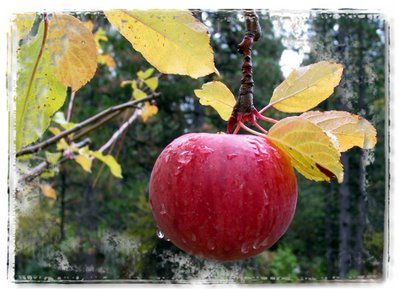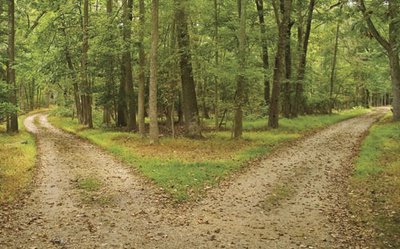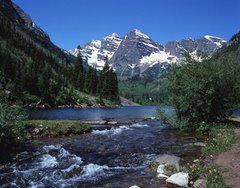Thursday, August 31, 2006
Wednesday, August 30, 2006
Heavenly Worship is a Portrait
There are four remarkable living being who are in the immediate presence of God (see Rev 4:6-7). Their primary function, is to give honour, glory and thanks to God. "Day after day and night after night they keep on saying, Holy, holy, holy is the Lord God, the Almighty the one who always was, who is, and who is still to come” (Rev 4:8).
Around the throne of God are twenty-four thrones. On these thrones sit the elders. Every time the living beings praise God the they worship with words that reflect the worthiness of the Lord to receive glory, honor and power. The Lord merits such a response because everything that exists was created by him for his own pleasure (Rev 4:11).
As we progress further in Revelation we witness the living beings and elders again worshipping God. This time they are singing a new song related to Jesus’ worthiness to open the sealed scroll. He has the power to perform this action because in death, he shed his blood, thereby ransoming people from every tribe and language group. The redeemed have become priests of God who will eventually reign on the earth (Rev 5:9-10).
Praise and worship of God in heaven is not restricted to the living beings and the elders. The rest of the angels are involved as well. We find them proclaiming the worthiness of the slaughtered Lamb to receive power, riches, wisdom, strength, honor, glory and blessing (Rev 5:12). Notice the reoccurring theme of the Lord’s worthiness.
The Apostle John then goes on to describe a great number of people, who have come out of the great tribulation, standing before the throne of God. Their song introduces a new theme that focusses upon the salvation that comes from God and the Lamb (Rev 7:10). The angels respond to this anthem with “Amen! Blessing and glory and wisdom and thanksgiving and honor and power and strength belong to our God forever and ever! Amen” (Rev 7:12).
The next time we witness the worship and praise of the elders it is of a different nature. They start their praise by acknowledging that God has assumed his power and has started to reign. With his kingship the time to judge the dead has arrived. Those who have been God’s holy people down through the ages will be rewarded richly. Their adoration of God then is expressed in relation to his judgment of the wicked who will be condemned to an unending and enduring destruction (Rev 11:17-18).
For a final time John witness praise in heaven. At this point Jesus Christ is totally victorious. All things are under his control and heavenly voices cry out “Praise the Lord! For the Lord our God, the Almighty, reigns. Let us be glad and rejoice, and let us give honor to him" (Rev 19:6-7).
Heavenly worship has included a number of important elements. There is the acknowledging of the holiness of God, his eternal nature, his creative power, his work of redemption, his holy judgments and his ultimate victory over evil. These are key components that need to be regularly incorporated into our adoration of God because they are the essence of his divine nature. We need to regularly ask ourselves the question “how does our praise line up with that of heavens?"
Copyright. Bruce August 2006
Note: All quotes taken from the New Living Translation Second Edition.
Posted by
Bruce
at
8/30/2006 08:39:00 pm
![]()
Labels: Articles
Tuesday, August 29, 2006
Thursday, August 17, 2006
Have You Ever Wondered What It Would Have Been Like
to have lived on earth before sin entered the world. It would have been much different than what we experience today. The Book of Genesis gives us some hints regarding this wonderful life.
Based on the book of Genesis, and assuming that the great flood did not create a difference in geography related to the location of the Tigris and Euphrates rivers, the Garden of Eden was probably located in what is current day Iraq. It would have been lush with all type of vegetation. In the beginning "The earth was watered by springs (or "mist") which "came up from the ground and watered all the land" (Gen 2:6).
Originally the earth’s vegetation included only good plants. Man's primary responsibility in the garden was "tend and watch over it" (Gen 2:15). His position was that of a caretaker and harvester. Living would have been relaxed and free from strain. God's curse upon humanity because of sin, at the time of the fall, caused the earth to "grow thorns and thistles" (Gen 3:18). Agriculture had all at once become a battle field.
Originally people were strictly vegetarians. They ate of the fruit of the garden (Gen 2:16). After the fall God indicated to Adam that "you will eat of its grains" (Gen. 3:18). Before the flood, both domestic and wild animals, lived in harmony and at peace with humanity. When the Lord blessed Noah after the flood, meat was introduced as a food source. God stated "I have given them to you for food, just as I have given you grain and vegetables" (Gen 9:2-3).
From the beginning man was given authority over God's creation. He was commanded by the Lord to "Fill the earth and govern it" (Gen 1:28). This rulership would have been totally wise and godly — considerably different than what we see today.
Obviously, there would have been no sickness or death prior to the fall. There would have been no sadness or sorrow. These realities of life are a result of sin (Gen 3:16-19). Life as God originally intended it to be in Eden would have been constantly vital, productive and eternal in nature. In fact, when Adam and Eve were put out of the Garden, God "placed a flaming sword that flashed back and forth to guard the way to the tree of life" (Gen 3:24) so that they would not be able to eat the fruit that would give them eternal life.
There was one other special thing about life on earth before the fall. God regularly visited Adam and Eve in the Garden. He would have wanted to spend considerable time with his special creation. Why else would he have made them in him image? We can't even begin to imagine the things God told them during those wonderful visits. On the day of the fall God (the pre-incarnate Christ) came to visit "When the cool evening breezes were blowing, (they) heard the Lord God walking about in the garden"(Gen 3:8). This may have been a daily routine.
Today, God does not come in a bodily form to meet with his children. However, we still have the privilege of meeting with the Lord God daily by means of prayer and Bible study. Through these meetings with God we can get to know him in ways that will pay eternal dividends.
Copyright. Bruce August 2006
Note: All quotes taken from the New Living Translation Second Edition.
Posted by
Bruce
at
8/17/2006 08:36:00 pm
![]()
Labels: Articles







